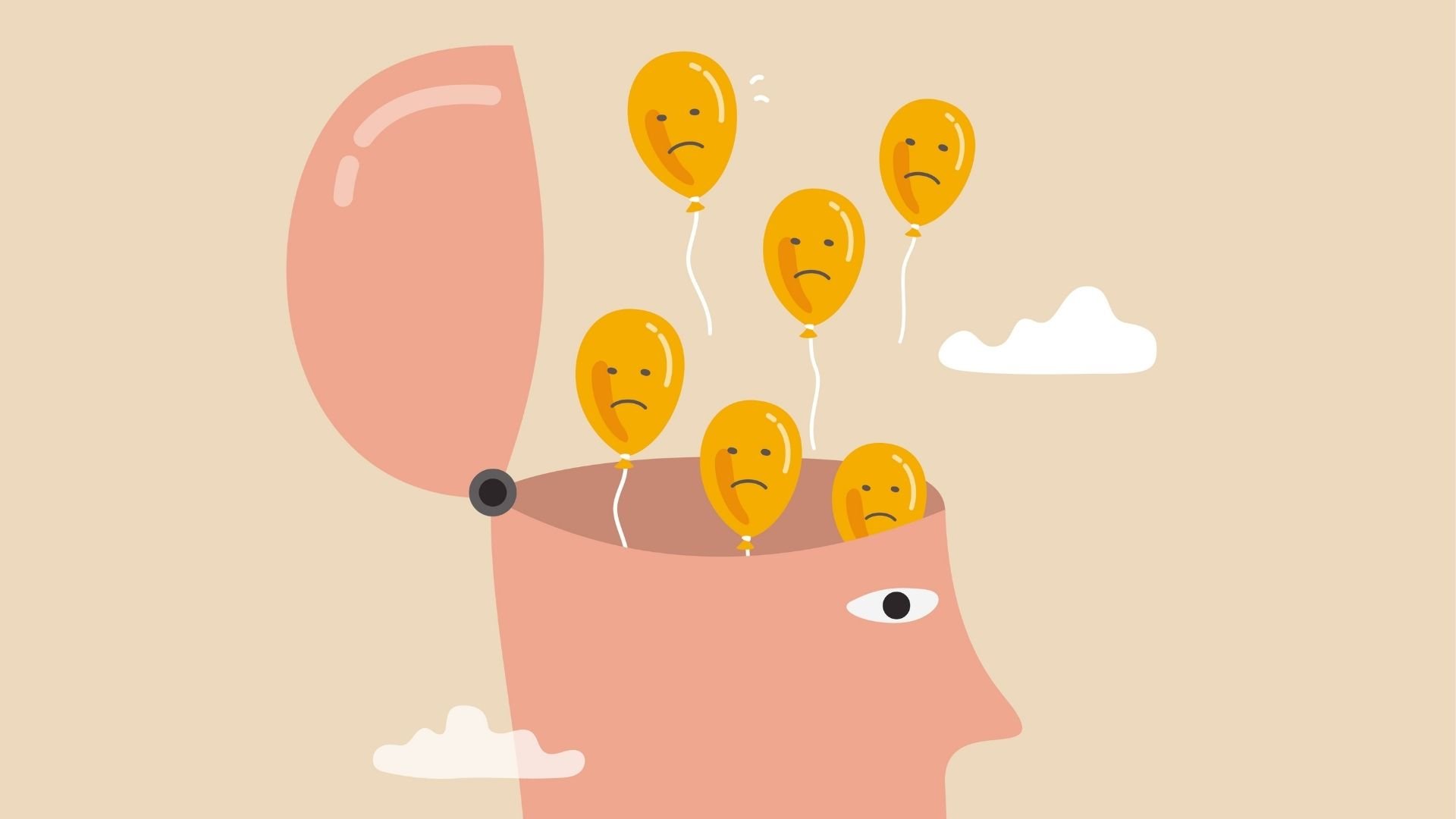How to free your mind and live the life you want
Dealing with unwanted thoughts can be quite a distraction to our every day life preventing us from focusing and achieving the life we want. Here's how you can learn to calm your mind and cope with those nagging, negative emotions.
Stressed out? Feeling overwhelmed or trapped by your thoughts?
If you're like most people, you've probably had times when your mind just wouldn't stop racing. Your thoughts might be about something that's worrying you or something that you're looking forward to. Either way, it can be tough to focus on anything else and it may leave you feeling "trapped" in a never end cycle of uncertainty and frustration.
If you're struggling with anxiety or stress, you might find yourself dealing with these kinds of thoughts more often. You might even start to feel like you're not in control of your own mind.
But there are things you can do to deal with unwanted thoughts and take back control of your mind. With a little effort, you can learn to calm your mind and focus on what's important to you, so you can start living the life you want.
Here's how:
Recognize that you are not your thoughts.
Thoughts are just thoughts. They are not who you are as a person, and just because you have a thought doesn't mean it's true or that you have to act on it.
Why do we have negative thoughts? Negative thoughts are a normal part of life that everyone has from time to time. They can come from stressful situations or they can come from anxiety, or other mental health issues.
Recognizing that you are not your thoughts can be a powerful first step in managing stress, anxiety or other forms of negative thinking. Why? Because when you realize that thoughts are just thoughts, they can't control you. You can start to see them for what they really are: fleeting and often irrational. This doesn't mean that your negative thoughts, stress, and anxiety will magically disappear. But, it can help you to see them in a new, more manageable light. Once you know what they are, you can start to deal with them in a more constructive way.
Negative thoughts can come in many forms. They might be self-defeating thoughts like, "I can't do this," or "I'm not good enough." Alternatively, they might be worries about the future, such as, "What if I fail?" or "I don't know what's going to happen."
Challenge your thoughts.
Once you've identified a negative thought, it's time to challenge it.
Ask yourself if there is any evidence to support the thought. Is it really true? Are you seeing things objectively? Oftentimes, our stress and anxiety are fueled by irrational thoughts. When we challenge these thoughts, we may begin to recognize them for what they truly are and frequently, they are false.
Practice self-compassion.
Negative thoughts can be harsh and unkind, especially when we aim them at ourselves.
If you find yourself being hard on yourself, try to show yourself some compassion. Just as you would comfort a friend who was going through a tough time, extend that same kindness to yourself. Be understanding and forgiving. Remember that everyone makes mistakes and everyone has off days. Be patient with yourself and stop being your own worse critic.
Try to replace negative thoughts with positive ones.
Once you can recognize that your stress and worry are caused by your thoughts, you can begin to modify them.
For instance, if you're constantly thinking, "I can't do this," try replacing that thought with, "I can do this." Or if you're worrying about the future, try replacing that worry with a positive affirmation, such as, "I am prepared for whatever comes my way."
Try to find a little humor in the situation. Life hits all of us with things we don’t expect and experiences we never thought we’d be having. It’s not always easy to find the humour in these situations, but it can be helpful. When you can laugh at your stress and anxiety, it can take some of the power away from them...or at the least help you to feel better.
Or, try a little gratitude. Gratitude is the practice of being thankful for what you have. It’s about being thankful for the good things in your life, even when times are tough.
Gratitude can help you see the bright side of life and focus on the positive aspects instead of the negative. Practicing gratitude can also be a helpful way to manage stress and anxiety. When you’re feeling stressed or anxious, take a moment to think about all the things you’re grateful for. It's a great way to give you perspective about your problems and issues and to focus on the good in your life... instead of what you perceive to be the 'bad'.
Replacing negative thoughts with positive ones takes time and practice. But little by little, you will start finding this ability to be a helpful strategy for managing stress and keeping anxious thoughts at bay.
Practice mindfulness.
Mindfulness is the practice of being present in the moment and accepting things as they are.
It can help you manage your feelings and tension by allowing you to step away from your worries and examine them for what they are: nothing more than thoughts. When you're anxious, it's all too easy to get caught up in your worries about the future. Mindfulness can help you to break out of that cycle and simply be in the moment.
The easiest way to start practicing mindfulness, is to focus your attention on your senses. What do you see, smell, taste, feel?
Alternatively, you can focus on your breath. Simply notice the sensation of breathing in and out. If your mind wanders, that's OK. Just gently bring your attention back to the present moment.
You can practice mindfulness at any time and anywhere. There is no right or wrong way to do it and there are many different ways to practice it... from yoga, to meditation apps, to journaling. The important thing is to find a method that works for you. Mindfulness can take some time to master, but it's worth the effort. Once you've mastered how to be present, you'll have a better arsenal of strategies for dealing with life's challenges. And you may notice that your mood improves as well.
Talk it out or write it down.
If you're feeling overwhelmed by negative thoughts, it's important to talk to someone about what you're going through.
Keeping your thoughts to yourself can make them feel more powerful and overwhelming. Talking to a friend, family member, or mental health professional can help you share your burden and start to work through your stress or anxiety.
Writing down your thoughts can also be helpful in dealing with them. This can serve as a way to get your thoughts out of your head and into a form that you can address more easily. Putting your thoughts into words can help you to better understand them and start to develop a plan for addressing them.
Get physical and practice regular self-care.
When our bodies are healthy, our minds tend to be healthier as well.
One of the best ways to handle built-up stress is to simply physically release it. Lace up your shoes and head outside. Walk, run, ride, hike... just get those feet and your body moving and get in those steps to release your frustrations.
Caring for your body and your physical health also means eating healthy foods, drinking lots of water, getting enough sleep and practicing regular self-care.
Self-care is anything that makes you feel good. The key is to make time for yourself and do something that makes you happy every day. This means taking time out of your busy schedule to do something that you enjoy. It could be anything from reading a book to taking a yoga class to going for a walk in nature.
Making time for yourself is important. It can help you to relax and recharge. It also provides you with the opportunity to focus on what is important to you - in the moment.
Connect with nature.
Nature has a way of calming our minds and making us feel at peace.
If you live in a city, it can be easy to forget that there is a whole world beyond the concrete jungle. But spending time in nature – even if it’s just a nearby park – can have a significant impact on your mental and physical health.
Studies have shown that exposure to green space can reduce stress and anxiety, improve moods and cognitive function, and boost overall physical health. So if you’re feeling overwhelmed, take a break and go for a walk in the park. It just might do wonders for your mental well-being.
Reconnect with yourself.
When's the last time you reflected on what YOU want?
Are you living according to other people’s expectations? Are you living your life for yourself and doing what makes you happy? Do you even know what would make you happy?
Take some time to reflect on the life you want for yourself:
Be honest with yourself about what you think, feel and want.
Be honest with yourself about your experiences, both painful and joyful.
Be honest with yourself about what’s most important to you in life, love and career.
Be honest with yourself about if you are living your life genuinely, or are you attempting to satisfy other's expectations or ideals?
Link your thoughts to your actions.
Freeing your mind is really about making your own decisions and choosing to act on them.
You can’t control all the messages and influences that enter your mind, but you can become conscious of them and choose which thoughts to believe.
The most disempowering thing you can do is entertain and speculate an endless chain of thoughts that aren’t related to your actual life.
The most empowering thing you can do is to choose to pursue thoughts which are linked to your life, purpose and goals, and establishing powerful daily habits that will allow you to achieve them.
The takeaway…
When we connect our thoughts to our actions, we are able to take control of our lives and steer ourselves in the direction we want to go. We can choose to believe the thoughts that empower us and lead us toward our goals, and ignore the ones that don't. So if you're feeling overwhelmed by stress, anxiety or negative thoughts, remember that you have the power to free your mind – and create the life you want to live.
We’re here if you need help
Therapy is a valuable tool that can help you to solve problems, set and achieve goals, or teach you new ways to track your emotions and keep negative thoughts, stress, and anxiety in check. It can help you to build the life, career, and relationship that you want. Does everybody need it? No. But if you are curious about working with a therapist, that curiosity is worth pursuing.
We know it takes a great amount of courage to examine your life and to decide that there are things you would like to change. And, it takes more courage to do something about it. We can help. We offer free consultations for anyone in Ontario considering individual or couples counselling, online at The Dot. We will go through any of your questions and concerns to help you decide whether online counselling is the right choice for you.
SOURCES
Psychology Today Are You an Overthinker?
Psychology Today 9 Strategies for Overcoming Overthinking


